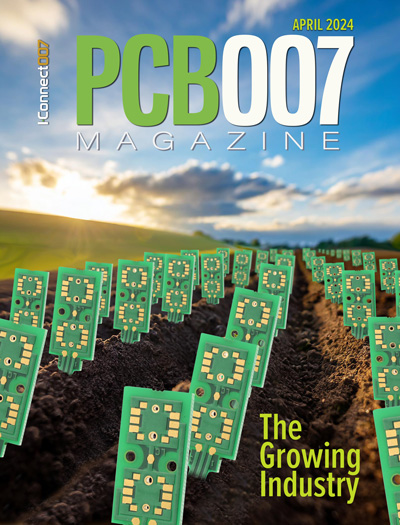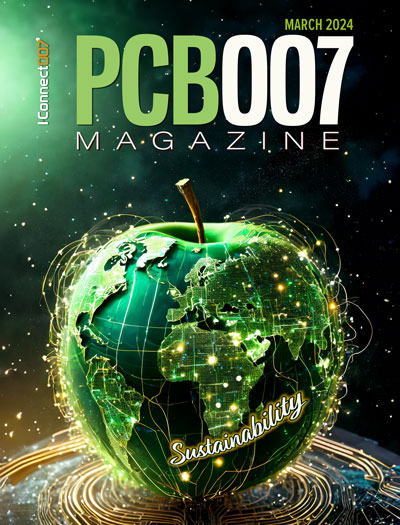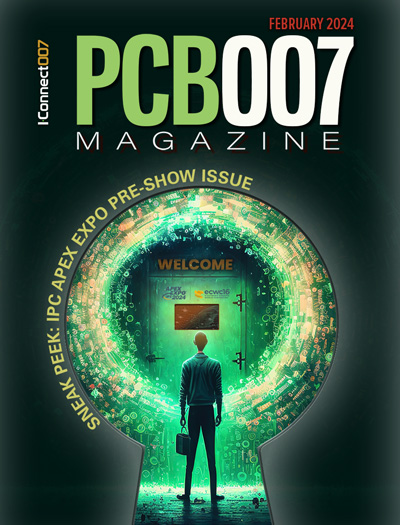-

- News
- Books
Featured Books
- pcb007 Magazine
Latest Issues
Current Issue
The Growing Industry
In this issue of PCB007 Magazine, we talk with leading economic experts, advocacy specialists in Washington, D.C., and PCB company leadership to get a well-rounded picture of what’s happening in the industry today. Don’t miss it.

The Sustainability Issue
Sustainability is one of the most widely used terms in business today, especially for electronics and manufacturing but what does it mean to you? We explore the environmental, business, and economic impacts.

The Fabricator’s Guide to IPC APEX EXPO
This issue previews many of the important events taking place at this year's show and highlights some changes and opportunities. So, buckle up. We are counting down to IPC APEX EXPO 2024.
- Articles
- Columns
Search Console
- Links
- Events
||| MENU - pcb007 Magazine
A Conversation with Laurent Nicolet, Schmid Group
December 7, 2014 | Barry Matties, I-Connect007Estimated reading time: 5 minutes
During the recent HKPCA and IPC Show, held in Shenzhen, China, I had a chance to talk with Laurent Nicolet, VP - PCB Business Unit of Schmid Group . The thing that really caught my eye was the crowd gathered around a piece of automation technology that they were displaying in their booth. Automation is in very big demand here in China. The following was transcribed from an audio interview I conducted in Schmid’s booth with Laurent regarding the technology and the changes he has seen in the China market.
007: So we’re looking at some flexible automation here?
LN: Yes, these are intralogistic, so it transports the parts from point A to point B. The system is fully intelligent; it can choose the way that you want even if the way is occupied or not. The big advantage of the system is it is fully flexible. If you need to extend or change the track it is very simple and not a lot of hardware is necessary for a change. The interesting things for the electronic industry is that you can have some assembly parts on the shuttle so that during the transport of the parts we can take currents from the rail and make a check of the parts.
007: This would certainly add value to what is normally a non-value added step, moving product from step to the next. So now, it’s not just transporting it’s adding value to the manufacturing process?
LN: Yes, that is when it is helpful and a benefit of the system.
007: Is this a system you guys designed?
LN: We acquired a company in Switzerland called Montratec a few years ago and now we have transferred the production partially in Germany and also in China.
007: The automation in China, there's a big demand for that, yes?
LN: It's a big demand now, especially in the car industry and the medical industry.
007: So what do you see here in the China market?
LN: I think for the next five years automation will be a big boom. Some companies are interested to buy some small machine such as this to assemble just one process and transfer it to the next one with this kind of logistic.
007: Now is this the only automation that you have to offer or do you have other products?
LN: No we call this intralogistic, just the logistic of the parts on a production, and we have a department in Germany where we make the full automation integration, where we can work on the parts directly and continue the process. We were originally using it more for photovoltaic before but now we have extended it to another type of industry.
Page 1 of 2
Suggested Items
Real Time with... IPC APEX EXPO 2024: all4-PCB, A Premier Solution Provider for the PCB Industry
04/22/2024 | Real Time with...IPC APEX EXPOIn the PCB industry, all4-PCB, is a top-tier equipment supplier and process solution provider. Ralph Jacobo highlights the active market and the demand for high-quality equipment, discusses their existing customers, investment in advanced substrates, and smaller board shops.
The Pulse: Drilling Down on Documentation
04/18/2024 | Martyn Gaudion -- Column: The PulseHow did a product aimed at signal integrity end up being more about documentation? For a little backstory, the Polar team has an unspoken “no business speak” rule at certain times. So, why is this column titled “Drilling Down?” I find it fascinating when a company sets off in one direction, but customers steer it in another. That’s what has happened here as customers took a product down a fork in the road we couldn’t predict. Your destination isn’t always where you initially set off to go, and that’s how we got to our subject of drills and drill documentation.
Real Time with... IPC APEX EXPO 2024: IPC Government Relations Holds Lawmakers Accountable
04/16/2024 | Real Time with...IPC APEX EXPOThe IPC Government Relations team is constantly educating Congress and the executive branch about the importance of a robust domestic electronics manufacturing industry. As Richard Cappetto explains, the GR team is focused on proactive strategies, workforce policies, and sustainability, as well as the significance of apprenticeship programs, President Biden's executive order, and employer incentives. Also discussed is the PCB Act, its investment program, tax incentive, and DoD's understanding of supply chain risk.
Catching Up With Chasom Electronics
04/16/2024 | Dan Beaulieu, D.B. Management GroupI recently met with Chasom Electronics’ founding director Anil Kumar. Chasom offers a unique menu of services for companies looking to extend their technology capabilities on a short- or long-term basis. Read on to learn about this very unique service company.
Marcy's Musings: The Growing Industry
04/16/2024 | Marcy LaRont -- Column: Marcy's MusingsAfter decades of steady decline in the U.S. and Europe, the PCB industry is finally growing, especially in China Plus One countries. The U.S. for example, which seemed to have abdicated its title as the world leader in innovating high-technology cutting-edge manufacturing processes, is now in a race to regain what it lost and then some. The PCB fabrication industry is growing in the West, thanks to DoD funding, the CHIPS and Science Act, and hopefully, the passing of HR 3249, the Printed Circuit Board and Substrates Act.


